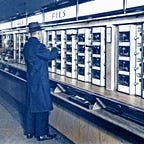There Really Was a Crazy Chester
‘The Weight’ by The Band, explained
The Band was made up of talented multi-instrumentalists and vocalists: four Canadians, Robbie Robertson, Rick Danko, Garth Hudson and Richard Manuel, and Levon Helm from Turkey Scratch, Arkansas. Its members met in Canada as part of Ronnie Hawkins’ band, the Hawks.
Hawkins, who grew up in Fayetteville, Arkansas, found success in Canada in the late 1950s and became a permanent resident. Helm was a member of the Hawks when the four Canadians joined in the early 1960s.
The Hawks left Hawkins in 1964 and a year later started working as Bob Dylan’s backing band. After he suffered a motorcycle accident in 1966, Dylan invited the Hawks to join him in Woodstock. The group rented the pink house in nearby West Saugerties that they would call Big Pink. During the period backing Dylan, the group settled on the name The Band.
Although it was never a big hit when it was released as a single, “The Weight” has become a rock standard. The Rock and Roll Hall of Fame named it one of the 500 Songs That Shaped Rock and Roll. “The Weight” has been performed by everyone from Aretha Franklin, Bruce Springsteen and Joe Cocker to Blues Traveler, Diana Ross and John Denver.
Its popularity belies the fact that “The Weight” almost didn’t make it onto 1968’s Music from Big Pink. Robertson, its writer, told Goldmine in 1991 that “The Weight” was considered a backup in case an extra song was needed.
“We’d tried it a number of different ways, but we weren’t that excited about it. So our attitude was, ‘Well, just in case something else isn’t working, we’ve got this song to fall back on.’ So we were in the studio, and just out of trying to not be boring, we said, ‘Well, let’s give that “Take a load off Fanny” song a shot.’
“And very quickly, someone suggested that maybe Garth should play piano and Richard should play organ, because it seemed like there was room for some fills that would sound more natural coming from the piano than the guitar. So they swapped, and we recorded it, and it wasn’t until we listened back to it that we realized, ‘Holy shit, this song’s really got something.’”
Robertson’s elusive lyrics have puzzled fans for decades. Many assume there’s a religious theme; the first line of the song, after all, is “I pulled into Nazareth.” But according to Robertson, Nazareth here is not the childhood home of Jesus. It’s a borough in Pennsylvania’s Lehigh Valley region, population about 6,000, chosen because C.F. Martin guitars are manufactured in Nazareth.
Author Peter Viney cites a 1991 interview with Vox in which Robertson credits the films of French director Luis Buñuel as the inspiration for “The Weight.”
“People like Buñuel would make films that had these religious connotations to them but it wasn’t necessarily a religious meaning. In Buñuel there were these people trying to be good and it’s impossible to be good. In ‘The Weight’ it was this very simple thing. Someone says, ‘Listen, would you do me this favor? When you get there will you say ‘hello’ to somebody . . .’
“‘I’ve only come here to say ‘hello for somebody and I’ve got myself in this incredible predicament.’ It was very Buñuelish to me at the time.”
“The Weight” is rich in characters, each one bringing another disappointment to the narrator. In his autobiography This Wheel’s on Fire: Levon Helm and the Story of the Band, Helm explained that the characters are based on friends of the band.
“The song was full of our favorite characters. ‘Luke’ was Jimmy Ray Paulman [former guitarist of the Hawks]. ‘Young Anna Lee’ was Anna Lee Williams from Turkey Scratch.
‘Crazy Chester’ was a guy we all knew from Fayetteville who came into town on Saturdays wearing a full set of cap guns on his hips and kinda walked around town to help keep the peace, if you follow me. He was like Hopalong Cassidy, and he was a friend of the Hawks.
“Ronnie would always check with Crazy Chester to make sure there wasn’t any trouble around town. And Chester would reassure him that everything was peaceable and not to worry, because he was on the case. Two big cap guns, he wore, plus a toupee! There were also ‘Carmen and the Devil,’ ‘Miss Moses’ and ‘Fanny,’ a name that just seemed to fit the picture.”
